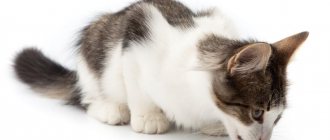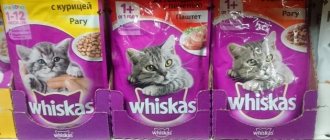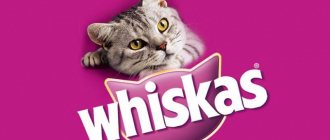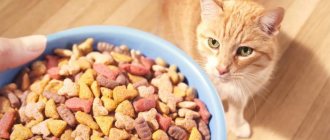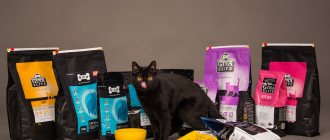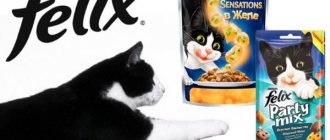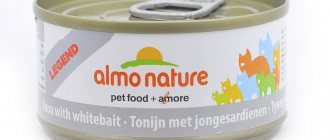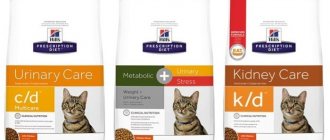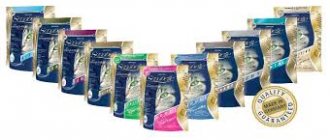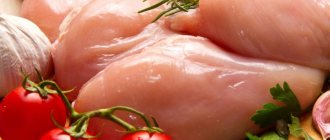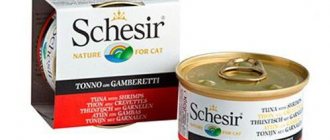In what cases are they needed and in what cases are they not?
The answer to the question whether a cat needs vitamins is clearly obvious. Of course, they are needed, otherwise, why would so many manufacturers create more and more vitamin complexes? But... this does not mean at all that every cat needs vitamins under all conditions. Let's give a couple of examples. Let's imagine that our cat eats carefully selected premium, or even extra-class dry food.
At the moment she does not have any stress, pregnancy or anything else out of the ordinary. Question: does she need vitamins now? Answer: definitely not. Otherwise, not only will there be no benefit, but, on the contrary, the cat may develop hypervitaminosis, which is much more difficult to get rid of than vitamin deficiency. Go ahead.
Let's imagine that our cat does not eat super premium food, but food from our table. That is, we are soup - she is soup, we are cutlet - she is cutlet. So, in this case, the cat needs vitamins. And don’t reassure yourself that cats have been eating this way for centuries. Not true. They ate the wrong thing. Because from time immemorial, food has been environmentally friendly, without any dyes, flavor enhancers and other rubbish. And even if you eat everything exclusively from your garden, this does not change anything.
Because there are really few truly ecologically clean places left on earth, and how likely is it that your garden is located in such a place? I think the answer is obvious. Therefore, both you and your tailed friends will need vitamins. Now let's talk about which vitamins are best to give. I would like to note right away that in each specific case the veterinarian will be able to select an individual complex, but it is better for us to be at least a little savvy in this matter. This will make it much easier for you and your veterinarian to collaborate. So, what are the different vitamins? Nowadays vitamins of three main groups are produced.
VITAMIN C
Vitamin C is an antioxidant, helps eliminate toxins from the animal’s body and is necessary for the full absorption of iron and calcium. Vitamin C is a powerful restorer and helps prevent processes such as inflammation and aging. It fights inflammation, aging and is needed for the absorption of iron and calcium. If your cat has red skin in the mouth and swollen gums, this is a sure sign that she is not getting the required amount of vitamin C. The situation can be improved by adding dairy products, carrots, lettuce and ascorbic acid powders to the cat’s menu.
Important vitamins for cats
- A . Prevents problems with the immune system and eyes.
- Groups B. The most important vitamins. They have an overall impact on the cat’s life. Important for the normal functioning of the nervous system, gastrointestinal tract, musculoskeletal system and the formation of muscle tissue. The deficiency affects the genitourinary system, skin and wool, and is fraught with problems with the eyes and mucous membranes. Mandatory for the normal functioning of the heart and blood vessels.
- WITH . A stimulant of the immune system, without which not a single process can do. In addition to providing protective functions, it promotes the absorption of mineral compounds and is actively involved in metabolism.
- D. _ It is unlikely that molting or changing teeth would be possible without vitamin D. It is important in the formation and development of all tissues and promotes the absorption of calcium. Especially important for kittens.
- E. _ A multifunctional nutrient that significantly affects the reproductive system. Without the participation of this vitamin, cats are not able to reproduce.
- TO . Participates in hematopoiesis. The normal coagulation pattern depends on it. If there is a deficiency, the slightest damage to the skin can lead to death.
The list is not exhaustive. The role of other vitamins should not be underestimated. In total there are about 13 groups of vital compounds. It is important to remember that vitamins only in combination with minerals and amino acids guarantee a cat’s health. The list of micro- and macroelements in most complexes has a standard composition.
Amino acids require special attention. Of the 23 groups of these substances, 11 are not synthesized in the cat’s body, which leads to irreversible consequences. Amino acids are involved in feline metabolism and metabolism. Without them, the normal functioning of any system is impossible.
In particular:
- taurine;
- arginine;
- isoleucine;
- lysine;
- threonine;
- tryptophan;
- methionine;
- leucine;
- phenylalanine;
- valine;
- histidine
VITAMIN A
Vitamin A regulates animal growth and supports nonspecific immunity, increases the protective function of mucous membranes, and is a powerful antioxidant. If it is deficient in the body, the functions of the reproductive system and digestion may be disrupted. Vitamin A also improves vision. The development and growth of the body is impossible without vitamin A - the growth vitamin. Kittens from birth to adulthood, as well as pregnant animals, urgently need it. A lack of vitamin A delays the development of the skeleton and the overall physical development of the kitten. In adult cats, a lack of vitamin A leads to stomach problems, dullness of the eyes, lethargy, loss of appetite, and a general weak state.
In its natural form it is found in egg yolk, beef liver, and butter.
To normalize the cat’s condition, veterinarians recommend giving the animal, depending on its weight, 0.5-5 ml of fortified fish oil every day for a month.
How to understand what vitamin a cat lacks?
As a rule, with natural feeding, it is recommended to give the cat vitamin and mineral complexes twice a year to prevent vitamin deficiency. If you do not do this in a timely manner, external manifestations will not take long to appear.
Lack of vitamins affects the appearance and behavior of the cat:
- continuous shedding, dull coat, unkempt appearance;
- decreased appetite;
- depressed state, lack of interest in life, activity, slow reaction.
It is possible to determine which vitamins are missing using laboratory blood tests, although experienced veterinarians often make do with a simple survey of the owner. Diet data gives an accurate picture of what vitamins your cat urgently needs.
Vitamins for kittens are prescribed regardless of the presence or absence of external manifestations of their deficiency.
VITAMIN B
Vitamin B strengthens the immune system, helps the body cope with diseases and harmful viruses. A lack of vitamins of this group (this includes such important vitamins for cats as B1, B2, B3, B5, B6, B12 and Bc) leads to metabolic disorders, decreased hemoglobin in the blood, weight loss, diseases of the nervous system, and deterioration of coordination of movements. , hair loss. If there is a deficiency of this vitamin, the animal will experience general weakness. If the cat is fed natural food, then the lack of B vitamins is eliminated by adding offal (liver, kidneys, heart) to the menu and adding yeast to boiled water (at the rate of 2-5 g per day depending on the weight of the cat) for drinking.
Causes of vitamin deficiency
The reasons that require the introduction of special fortified supplements into the diet are various factors. But the main thing is to feed the cat natural products. No matter how varied and balanced you prepare your food, the content of vitamins, and even more so their absorption, is impossible to control.
The lack of vitamins is influenced by natural stressful situations in a cat’s life:
- Dog's sense of smell
- Maine Coon
- Domestic iguana
- How much does a raccoon cost?
- Interesting facts about cats
- Cute dog breeds
- molting;
- change of teeth;
- pregnancy;
- birth of kittens;
- change in diet;
- change of detention conditions;
- nervousness;
- puberty.
In addition, poor absorption of vitamins due to helminthiasis, gastrointestinal diseases, and infectious diseases cannot be ruled out. Taking any medications for a long time provokes metabolic disorders, which contributes to the appearance of vitamin deficiency.
What nutrition does hair need: care from the inside
The internal state of the body and nutritional habits are directly reflected in the external characteristics of the hair. That is why to improve the health of your curls you need to carefully review your diet. To add strength and shine to them, you need to consume a sufficient amount of vitamins, microelements and other nutrients daily.
If you adhere to strict diets and rarely spend time in the fresh air (for example, during general quarantine), the body gradually uses up its internal reserves of nutrients. Since they are poorly replenished, vitamin deficiency becomes visually noticeable. An unbalanced diet can lead to loss of hair thickness, high fragility and split ends.
Nutrition that is good for hair should include:
It must be taken into account that time must pass after a radical change in diet. You will not be able to notice the result in 1-2 days: to objectively assess changes in the condition of your hair, you need to wait at least 3-4 weeks. Nutrients from food that affect hair health will gradually accumulate in the body and improve the condition of the curls. If you follow a balanced menu during the quarantine period, you will gradually notice the appearance of new hairs, which will increase the overall density of your curls.
How to choose?
So, let's try to figure out together how to choose vitamins for a cat.
- We analyze the type of cat's diet: natural feeding or ready-made industrial food.
- We clarify the pet's age. Most manufacturers indicate on their products what age it is designed for: for kittens, for older cats, for adult animals.
- We take into account the physiological state of the animal. Pregnant, lactating, spayed and neutered animals have their own complexes.
- We assess your health status. Vitamins are divided into preventive ones for healthy cats and narrowly targeted ones for animals with certain health problems.
- Pay attention to the appearance of the cat. There is a whole list of vitamins for the beauty and health of skin and coat.
- Be sure to consult a veterinarian. Only a specialist, after certain studies of the animal, will be able to accurately prescribe a complex or single drug to saturate the cat’s body with certain vitamins and minerals.
- We adhere to the animal's taste preferences. Manufacturers produce complexes with various flavors: seafood, chicken, rabbit, beef.
- We choose vitamins of the desired structure: tablets, capsules, solutions, pastes, crackers, injections, suspensions, powders.
Phytomines
To solve specific health problems and for certain categories of cats, special phytomins are produced - a complex that includes not only minerals, but also medicinal herbs. The advantages of such drugs include their naturalness, safety and direction of action. The dosage of components is carefully adjusted to solve health problems.
Veda and GematoKat produce mainly herbal vitamins for cats. The latter manufacturer has a special complex for kittens, and TM Veda provides phytomines for any animal.
Types of vitamins by dosage form - tablets, injections, pastes, drops
Manufacturers of vitamin and mineral products for cats try to satisfy all the needs of consumers and develop preparations of various structures and methods of application. The market for veterinary products widely includes both conventional vitamins in the form of tablets and enteric capsules, as well as all kinds of injectable preparations, pastes, crackers and powders.
Vitamins in tablets (crackers)
Complex tablets are often released in the form of crackers, reminiscent of commercial food pellets, to attract the attention of cats. And to reduce problems with taking vitamins, manufacturers make tablets with meat, fish, cheese or milk taste and aroma.
Vitamin tablets are convenient to give to adult animals that can chew them. These fortified feed additives are given to kittens in crumbled form, mixed with food. The shape of the tablets can be either round or in the shape of hearts, fish, mice. The color range of the drugs is also extensive. Many manufacturers produce vitamins in tablets (crackers) of different colors, so that you can distinguish them by composition and taste, as well as for convenient division into morning and evening doses.
The best vitamins for cats in tablets:
- 8 in 1 Excel Brewer's Yeast (brewer's yeast);
- Beaphar Kitty's Mix;
- AniVital FeliDerm;
- Polidex Immunity up;
- Agrovetzaschita Radostin.
Vitamin injections (shots)
Vitamins in the form of injection solutions (injections) are indicated for those cats that, for some reason, cannot take medications orally. It should be borne in mind that the prescription of such vitamin-mineral complexes must be made by a veterinarian. Only he can determine what vitamins an animal needs and in what dosage. It is prohibited to inject cats with vitamins and other medications on your own.
TOP vitamins in injections:
- Vittri-1 (Agrovetzaschita);
- Vittri-3 (Agrovetzaschita);
- Gamavit (GamaVetFarm);
- Multivitamin (Norbrook);
- Cyanocobalamin B12 (Mosagrogen).
Fortified pastes for cats
The release of multivitamin health-improving preparations for cats in the form of pastes is determined by the physiology of the animal. Vitamins for cats in the form of a paste are applied to the animal’s front paw. The cat absorbs the vitamin preparation on its own when it licks its paw. You can give the required dose of the product by squeezing the paste from the tube directly into the animal’s mouth or offering it from your hand.
List of the best fortified pastes:
- Beaphar Duo Active Paste;
- Gimpet Multi-Vitamin Paste Extra;
- Gimpet Malt-Soft Paste Extra;
- Nutri-Vet Pet-Ease;
- Beaphar Malt Paste.
Liquid vitamins in suspensions (drops)
Liquid fortified preparations are produced on the basis of oils or water, packaged in capsules or bottles. Liquid vitamins for cats are easy to use. There is no need to persuade your cat to swallow or chew a healthy tablet. They are added to water, milk or animal food. You can inject them directly into the animal’s oral cavity using a medical syringe without a needle. This method is most convenient if vitamins are prescribed to kittens or sick animals that have no appetite. Vitamin drops are used as a prophylaxis for certain diseases and are used as an auxiliary drug in the treatment of certain diseases.
The best liquid vitamins for cats:
- Beaphar Laveta Super;
- Petvital Energy (Canina);
- Nutri-Vet Probiotics Salmon Oil;
- VetExpert VetAminex;
- VitOkey (Agrovetzaschita).
Multivitamins for cats
These drugs contain 2-5 vitamins and/or minerals in one tablet or capsule. They are selected taking into account compatibility and digestibility. Among the 5 applicants, two participants, described below, deserve special attention.
Polidex Multivitum
The complex is relevant both when feeding with artificial feed and with natural food. The tablet form is convenient to take - they can be crushed and added to food or given by hand. Thanks to adequate smell and taste, the animal reacts normally.
To improve health, adult cats are given 1 tablet. per 1 kg of body weight one to three times a day. It is best to conduct courses in spring and autumn, during a period of decreased immunity. A short break between them is allowed - 1-2 months. As a result of long-term use, no side effects occur.
Polidex Multivitum is useful as a general tonic for aging and older cats. The tablets strengthen the immune system and prevent hypovitaminosis. For this purpose, vitamins A, E, C, B1, B6, B12, D were introduced into the composition in high concentrations.
Advantages:
- There are 200 tablets in a package;
- Contains minerals - iron, manganese, calcium, iodine;
- They go well with both ready-made and homemade food;
- Low likelihood of side effects;
- They do not have artificial colors or flavors.
Flaws:
- Expensive.
As they say in the reviews, if you have whims while eating, adding vitamins helps restore a healthy appetite.
Omega Neo with taurine and L-carnitine
A budget option aimed at kittens and cats. The benefits of the tablets are to increase visual acuity, strengthen teeth and bones, and form strong muscle mass. It also supports the normal functioning of the cardiovascular and immune systems.
Omega Neo is considered as a permanent supplement to natural or artificial nutrition. It can be given to pets throughout the year, 3-6 pieces. adults and 1-4 pcs. - kittens. The likelihood of an overdose is reduced to zero. The drug is combined with all complexes and feeds. Vitamins for cats also help against hair loss.
Omega Neo consists of brewer's yeast and milk powder. In order for cats to take the tablets with appetite, a flavoring additive has been introduced into the composition. Omega-3 fatty acids are used to take care of the heart. The formula also contains taurine, which normalizes the functioning of the nervous system, strengthens blood vessels and breaks down fats.
Advantages:
- Reduce the likelihood of obesity;
- Help in developing healthy habits;
- Cheapness;
- No adverse reactions;
- Wide spectrum of action.
Flaws:
- Not detected.
Reviews demonstrate that the drug is suitable for both purebred and ordinary cats.
Types of vitamins by purpose - age, health status, functional characteristics
Vitamin and mineral complexes for cats differ not only in the form of release, their main gradation is in purpose. There are general strengthening multivitamin preparations, combined and single preparations for certain painful conditions, as well as vitamins for pregnant, lactating, castrated and sterilized animals. Age is another important condition for choosing vitamin supplements. It is known that the growing body of a kitten needs a completely different set of microelements than the body of an elderly, inactive animal.
Multivitamins (multivitamins)
The most common group of medications that is most popular among cat owners are multivitamin complexes. As a rule, they contain a full range of vitamins and minerals that are necessary for the normal growth and development of the animal. Available for all age groups: kittens, adult animals, aging cats. They have a general strengthening and health-improving effect. Prescribed for the prevention and treatment of hypovitaminosis.
The best multivitamins for cats:
- Beaphar Top 10;
- Gimpet Multi-Vitamin Paste Extra;
- VetAminex;
- Radostin for adult cats up to 8 years old;
- Biorhythm with the taste of seafood.
Vitamins to strengthen the immune system (general strengthening)
Immunostimulants are complexes for strengthening the immune system of cats, which increase the animal’s body’s resistance to diseases and negative environmental influences. Vitamins for strengthening the immune system necessarily contain antioxidants, essential amino acids, adaptogens and essential macro- and microelements. Immunostimulants can be given to cats only as prescribed by a veterinarian. When using this type of medication, you must make sure that the animals do not have parasites. Parasites significantly reduce the immunity of cats.
TOP vitamins for immunity:
- Gimpet Topinis;
- Nutri-Vet Multi-Vite Paw-Gel;
- VetoMune VetExpert;
- Omega Neo for cats with biotin and taurine;
- Phytomines for immunity.
Vitamins for removing hair from the stomach
During the daily washing of cats, some of the hairs enter the animal’s stomach, thereby creating “hairballs” in the stomach. As these lumps accumulate, they negatively affect the mood and health of the pet. Hair removal vitamins help remove hairballs from the animal’s stomach easily and painlessly. Modern products contain plant fibers and special phytocomplexes that not only remove hair, but also prevent the formation of new hairballs.
List of the best vitamins for removing hair from the stomach:
- Beaphar Malt Paste;
- Gimpet Malt-Soft Paste Extra;
- Hairball Soft Chews for Cats;
- Beaphar Bits Mix;
- Cliny Ag+.
Vitamins for healthy skin and beautiful coat
“Shedding” not according to schedule, dull fur, combed skin - all these are signs that the animal lacks vitamins B and H, taurine and biotin. Complex preparations for the skin and coat are prescribed to animals by veterinarians, and they can also be given before cat shows to improve the appearance of the animal. Vitamins of this group prevent premature shedding and reduce its time, improve the quality of the coat.
The best vitamins for skin and coat:
- FeliDerm (AniVital);
- 8 in 1 Excel Brewer's Yeast;
- Gimpet Beauty-Kiss;
- Doctor Zoo "Skin and Coat Health" with biotin and taurine;
- Farmavit Active for cats “Beauty and health of fur.”
Vitamins for healthy teeth and bones
Narrowly targeted complexes for teeth and bones have a balanced composition of calcium, magnesium, phosphorus and a number of vitamins. Drugs in this group are prescribed to kittens during intensive growth as a preventive measure for rickets, to pregnant cats and aging animals to prevent bone tissue destruction. Vitamins are used in complex therapy of animals that have undergone trauma and surgery. Also, medications for healthy teeth and bones are indicated for all naturally fed animals.
TOP vitamins for teeth and bones:
- Beaphar Irish Cal;
- Polidex Gelabon Plus;
- ArthroVet Complex HA;
- VEDA Phytomines for teeth and bones;
- Cat mineral tabletten.
Vitamin and mineral complexes for pregnant and lactating cats
Cats expecting offspring, as well as lactating animals, can often suffer from hypovitaminosis. Therefore, it is so important from the first days of pregnancy and feeding to choose a complex drug that will replenish the loss of vitamins and minerals in the cat’s body. Particular attention in preparations of this type is paid to the increased content of folic acid and vitamin E, which are responsible for the reproductive functions of cats. Almost all pet supply manufacturers have a line of vitamins for pregnant and lactating cats.
The best complexes for pregnant and lactating women:
- Beaphar Junior Cal;
- Farmavit Neo for pregnant and lactating cats;
- Radostin for pregnant and lactating cats;
- Farmina Vit-Active;
- Unitabs Mama+Kitty (Neoterika).
Vitamins for castrated cats against hair loss
After castration, cats often experience an increased degree of hair loss. That is why caring owners often turn to vitamin complexes based on taurine and biotin. Scientists have found that a lack of vitamin H (in other words, biotin) and taurine in the cat’s body causes inflammation of the hair and, as a result, hair loss. Thus, vitamins to prevent such an unpleasant problem allow you to normalize metabolic processes in the tissues of the epidermis, cure hypovitaminosis, as well as embryonic mortality. They eliminate inflammation on the skin, normalize metabolic processes in the body, regulate the nervous system and, of course, help maintain the natural beauty of the pet’s coat.
Vitamins for sterilized cats and neutered cats
The main health problems in spayed and neutered cats are associated with an increased risk of urolith formation in the urine, which can lead to urolithiasis. Therefore, such animals are recommended to take fortified supplements that optimize urinary tract function and reduce fatty acid levels. This is achieved through glucose, zinc, lecithin, L-carnitine and vitamins B3 and B12.
Vitamins for sterile animals help control their weight and prevent the development of obesity. Obesity in sterilized cats, which develops against the background of hormonal changes in metabolism, is one of the most common complications after surgery.
TOP vitamins for sterilized and neutered animals:
- VEDA Phytomines for castrated cats;
- Radostin for neutered male and female cats;
- Farmavit NEO for castrated;
- SEVAvit for castrated and sterilized cats;
- Unitabs SterilCat with Q10 for cats.
What is the difference between castrated cats?
Before considering proper nutrition for neutered cats, it is necessary to understand how they differ from non-neutered pets. The fact is that after a cat’s testes are removed, its hormonal levels undergo significant changes. This is how they completely cease to be interested in the opposite sex. In addition to the fact that cats stop meowing menacingly and constantly marking their territory, they become more docile and calm. By the way, their interest in cats, as a rule, is replaced by an incredible passion for food. This is why neutered pets often have a tendency to become obese. The main rule in this case is not to overfeed, because too much food is not good for the cat’s health.
Vitamins for kittens
Breastfed kittens receive all the necessary vitamins and minerals from the cat's milk. At the age of 2-3 months, they switch to adult food, they need additional vitamins and minerals. If ready-made food of at least “premium” class is used for feeding, then vitamins can be given to kittens only as prescribed by a veterinarian for special indications, so as not to cause hypervitaminosis.
Those who receive natural food need additional vitamins without fail. Preparations for adult animals do not contain sufficient amounts of micro- and macroelements necessary for a growing body. Therefore, manufacturers are developing special formulas of vitamin and mineral complexes for kittens.
The best vitamins for kittens:
- GimCat Baby-Paste;
- Beaphar Kitty's junior;
- Farmavit Neo for kittens Energy of growth;
- Radostin for kittens;
- Phytomines Hematocat for kittens.
Vitamins in ready-made cat food
Vitamins for cats in ready-made food
When choosing ready-made food for cats, the annotation for which, as a rule, indicates certain vitamins it contains, owners often focus on the taste preferences of their pets and price. However, it is in inexpensive food that there are artificial flavoring additives, aromas that are so attractive to cats, as well as dyes. The presence of vitamins in food will not offset the harm from such fillers.
Preference should be given to ready-made premium food, having carefully studied the information on the packaging, which indicates the age of the animal for which the product is developed, the cat breed, and contraindications. These types of food are also differentiated depending on whether the animal is sterilized or not.
Feedback from cat owners
Kate
I have been looking for the best vitamins for cats for a long time. But in the end I decided that everyone has their own needs. At home there is a long-haired yard cat and a titled Oriental. Cats are neutered, but have diametric needs for vitamins. Yard Muska needs any multivitamin complex a couple of times a year to look like a star at an exhibition. And the purebred Myrtle appeared recently. Reacts painfully to the slightest deviation from the diet. Muska vitamins CANINA and Doctor ZOO are categorically not suitable for him - to the point of vomiting. Only BEAPHAR is perceived normally. Expensive, but effective. Now there are two stars in the house, both on the general TOP 10 CAT.
Inga
I came across the need for vitamins very unexpectedly. The cat is 10 years old - straight, looks normal, behaves the same. Lately, however, she has become sluggish, but we decided that age is taking its toll. At some point, a friend brought POLIDEX. It's called Gelabon+Glucozamine. The British cat refused, she felt sorry to throw it away, so we were lucky. After five days we realized that we were disgusting hosts. Because the cat’s fur has stopped growing, it’s shiny and glossy, and on top of that, it’s become interested in life. Probably there weren't enough vitamins.
Faith
We have been familiar with GIMPET pastes for a long time. The cat is a Persian, sometimes we buy Malt-Soft Extra to avoid problems with hairballs, but not systematically. And then a kitten appeared. For my birthday I was given an exact copy of our cat. Along with him they brought Baby-tabs vitamins for kittens. Tosya ate them, of course. After a week, we understood what a real Persian should look like and what beautiful fur is. We bought a separate “8 in 1” complex – Brewers. We give everyone their own. We make sure they eat it. Now we have something to be proud of - they look like the picture.
Price of vitamins for old cats
You can buy medications at a veterinary pharmacy or online. Approximate prices for products in Moscow:
| Name of additives | Average price, rubles |
| Gimpet Schnurries 60 pcs. | 900 |
| AniVital Feli Immun 140 pcs. | 1700 |
| Polidex Gelabon 60 pcs. | 1300 |
| Beaphar Irish Cal 250 g | 600 |
| Sanal Senior Lecithin 50 g | 145 |
| Beaphar Top 10 Cat 180 pcs. | 600 |
So, let's summarize
In the situation with vitamins, “more” does not mean “better,” especially if the cat has concomitant diseases. Vitamin preparations differ in composition and quality, and good vitamins for animals are expensive.
Vitamins should not be confused with treats, which are often disguised as vitamin supplements. Some cat treats are advertised as vitamin supplements when they are not, and they can also be high in calories, which can lead to excess weight gain. Always consult your veterinarian about the need to use certain vitamin preparations or nutritional supplements.
Video
Features of the use of drugs
Vitamins for older cats are given in double dosage - from 2 to 6 tablets or 10–20 g of powder per day. They are taken morning and evening with food or treats. If the cat refuses the drug, it must be replaced with a more palatable one. The course lasts on average 1–1.5 months, after which a two-month break is taken, and the therapy is repeated again.
If any adverse reactions occur on the part of the body, supplements should be discontinued. Side effects include allergies, rash, nausea, vomiting, diarrhea. Contraindications to taking vitamins include intolerance to the components of the composition, intestinal obstruction, and exacerbation of chronic diseases.
Test for prostate cancer - PSA
It stands for prostate specific antigen and is a tumor marker that determines the risk of developing prostate cancer. Prostate cancer is one of the main causes of death in men among other cancers, so the study should be carried out regularly from the age of 35-40 years.
This test must be taken by all healthy men, even if they feel ideal. Prostate tumors are insidious and can develop quickly and asymptomatically. A simple laboratory examination will detect the disease at an early stage, when it is possible to cure.
What does the thyroid gland need?
Murzaeva Irina Yurievna
Endocrinologist, Preventive Medicine Doctor
June 7, 2015
I was inspired to create this article by studying the enzyme-biochemical processes in the thyroid cell. It is impossible not to pay attention to the amazing fact - how many microelements, except iodine, are involved in the metabolism of hormones and the thyroid cell itself.
Repeatedly in our and foreign literature I have drawn attention to studies on the dysfunction of microelements and their connection with thyroid diseases, here are excerpts:
“......a small amount of zinc is detected in the colloid of the thyroid glands of embryos and fetuses, which increases with fetal maturation. After birth, zinc content continues to increase. In hyperthyroid goiter, especially Graves' goiter, a significant amount of this element is contained... Selenium is part of another important enzyme - deiodinase, which catalyzes the reaction of T4 deiodination (formation of the T4 hormone). For example, diseases of the thyroid gland such as diffuse non-toxic goiter, diffuse-nodular (multi-nodular) goiter, endemic goiter can definitely be associated with a deficiency of selenium, zinc, iodine in the body. AIT - with a deficiency of zinc and selenium and an “excess” of iodine.
Now more details. The most important vitamins involved in the metabolism of the thyroid gland are vitamins B2, B1, B6, vitamin C; the most important microelements are iodine, vitamin D, selenium, zinc, vanadium and the amino acid tyrosine.
A lot of literature has been written about the leading microelement of the thyroid gland - iodine, so I will not dwell on it here, I will only say that for preventive measures it is better to use iodized salt, but for treatment - iodine preparations.
Experience shows that in the treatment of thyroid diseases, these vitamins/microelements are best used not as part of multivitamins, but as a “separate set.” B1 and B6 (as a solution for intramuscular use) or in the form of B-vitamin complexes - Neuromultivit, Berocca, Milgamma, by the way, there is no overdose when using B1 and B6.
B2 (riboflavin). It is actively destroyed under the influence of insufficient or increased thyroid function. It is not difficult to replenish it with ordinary products: yeast, milk powder, almonds, cocoa, chicken eggs and quail eggs, veal, peanuts, lamb, beef, buckwheat, oatmeal, spinach, green peas, cauliflower, potatoes, cottage cheese. The human body is not able to accumulate riboflavin; almost any excess will be quickly eliminated from the body (which is why it is needed in food - every day!). For women, 1.3-2.2 milligrams of riboflavin are needed per day, and for men, 1.4-3 milligrams of riboflavin.
The thyroid gland has a greater “need” for selenium, and a lesser one for zinc.
Selenium, zinc, vit. C, for example, is simultaneously contained in a drug such as Selzinc Plus, and each is also produced separately. Selenaktiv, Selenochel, Selenium-6, Selenium forte, Oligo selenium, Selenium chelate are a variety of selenium preparations.
The need for selenium depends on gender and age. The daily requirement for men is 70 mcg/day, for women - 55 mcg/day. In children, the dose is 1 mcg per 1 kg of weight. The maximum daily dose is 400 mcg), on average one tablet contains 50 mcg of selenium.
Zinc preparations are Zincite, Zincteral, Zinc Picolinate, Flavo Zinc, Bio Zinc, Zinc Chelate.
Requirement for zinc: at the age of 6 months to 3 years – 3–5 mg/day; from 3–8 years – 5–8 mg/day; from 8–13 years – 8–11 mg/day; boys from 13–18 years old – 11–15 mg/day, girls – 9–12 mg/day; men over 18 years old – 15–20 mg/day, women – 12–15 mg/day; pregnant and breastfeeding women – 20–25 mg/day.
Before using the drugs, and this is desirable, a lack of selenium and zinc can be determined by donating blood from a vein. Thanks to selenium and zinc, iodine, the main microelement of the thyroid gland, is better absorbed!
Natural zinc is contained in beef, liver, seafood, carrots, onions, rice bran, and oatmeal. But selenium can only be obtained from bread if it was grown on selenium-containing soil!
But who is this amazing vanadium? Chemists call vanadium an ultramicroelement - this is the name given to those elements whose content in the body does not exceed 0.000001%.
Products that contain the most vanadium are not rare or inaccessible - these are brown rice, buckwheat, barley, oats, beans and peas, potatoes, peppers, radishes and green salad, parsley, dill, beets, carrots, cereals, cherries and strawberries; vegetable oils, animal fats, fatty meats and liver, mushrooms, soybeans, some seafood and fish. In order to receive the required amount of vanadium, a person almost always has enough normal nutrition.
I have already written about the use of vitamin D before and will write separately, the topic is interesting.
The amino acid Tyrosine is a non-essential amino acid (that is, it is easily obtained by the body from foods). This substance is found in nuts and seeds. Almonds, peanuts, sesame seeds and pumpkin seeds are especially beneficial. Dairy products are also rich in tyrosine, because tyrosine is part of the casein protein that is present in them. This amino acid is also found in some fruits - bananas, avocados. You can also get tyrosine from the drug L-thyrosin 500 mg / Tyrosine is also especially important for “forming a good mood” and is something of a type of antidepressant!
These are the interesting facts I learned about the thyroid gland.
This article is in no way a “call to action”, but merely “food for thought” for you and your doctor, and, at the same time, an attempt to share your thoughts about the prospects for treating thyroid diseases.
Important! Message from the site administration about questions on the blog:
Dear readers! By creating this blog, we set ourselves the goal of giving people information on endocrine problems, diagnostic methods and treatment. And also on related issues: nutrition, physical activity, lifestyle. Its main function is educational.
Within the framework of the blog, in answering questions, we cannot provide full-fledged medical consultations; this is due to both the lack of information about the patient and the doctor’s time spent in order to study each case. Only general answers are possible in the blog. But we understand that not everywhere it is possible to consult with an endocrinologist at your place of residence; sometimes it is important to get another medical opinion. For such situations, when a deeper dive and study of medical documents is needed, at our center we have a format for paid correspondence consultations on medical documentation.
How to do it? Our center’s price list includes a correspondence consultation on medical documentation, costing 1,200 rubles. you can send scans of medical documents, a video recording, a detailed description, everything that you consider necessary regarding your problem and questions to which you want answers. The doctor will see if the information provided can give a full conclusion and recommendations. If yes, we will send the details, you will pay, and the doctor will send a report. If, based on the documents provided, it is impossible to give an answer that could be considered as a doctor’s consultation, we will send a letter stating that in this case, absentee recommendations or conclusions are impossible, and, of course, we will not take payment.
Sincerely, Administration of the Medical
